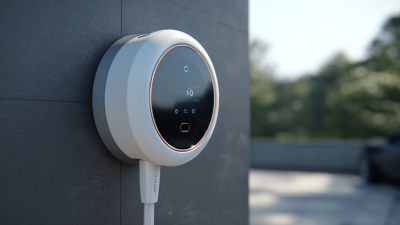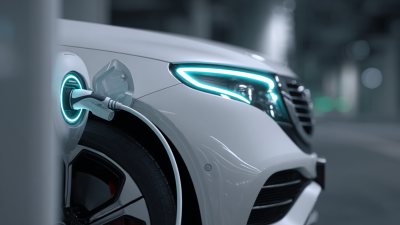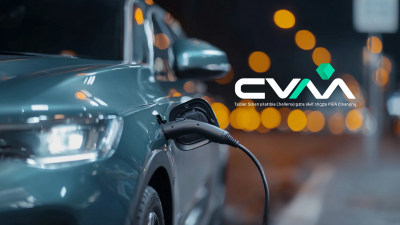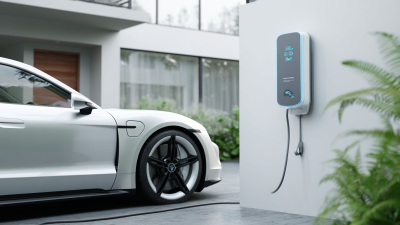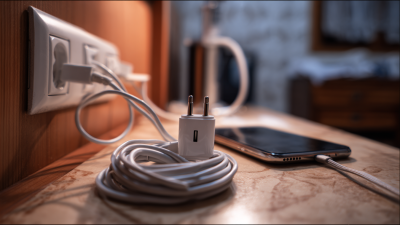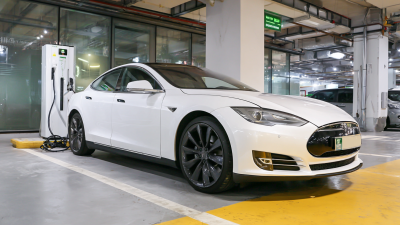Choosing the right Home Car Charger for your electric vehicle (EV) can significantly enhance your driving experience and ensure that your vehicle is always ready to go. With the growing number of EV models and the varying charging needs they entail, selecting the best charger can be a daunting task. Factors such as charging speed, compatibility with your vehicle, and the available electrical infrastructure at home play crucial roles in your decision-making process. Furthermore, understanding the differences between Level 1 and Level 2 chargers, and the importance of smart charging features, can provide you with the insights needed to make an informed choice.

In this tutorial, we will guide you through the essential elements to consider when selecting a Home Car Charger, empowering you to find the perfect solution tailored to your EV needs and lifestyle.
When choosing a home car charger for your electric vehicle (EV), it's crucial to understand the different charging types available: Level 1 and Level 2. Level 1 chargers typically utilize a standard household outlet and deliver about 4-5 miles of range per hour of charging. This option is convenient for overnight charging but may not meet the needs of those who drive longer distances regularly. In contrast, Level 2 chargers, which require a dedicated 240-volt outlet, can provide 10-60 miles of range per hour, making them a more efficient choice for daily use and faster turnaround times.

The U.S. electric vehicle charger manufacturing market is witnessing significant growth, driven by the increasing adoption of EVs and the need for widespread charging infrastructure. Level 2 chargers dominate the market due to their affordability and efficiency, accounting for a substantial portion of AC charging stations. With AC charging comprising about 67.7% of the market share, it's clear that consumers are leaning towards solutions that offer quicker charging times. Addressing the gaps in charging station coverage across the U.S. is essential, as the expansion of fast-charging options can ensure that up to 94% of counties achieve at least 75% fast charger availability, facilitating a smoother transition to electric mobility for all drivers.
When selecting a home car charger for your electric vehicle (EV), several key features are essential to consider to ensure it meets your needs. Firstly, charging speed plays a crucial role; many modern chargers offer a range from 16 to 40 amps, which can significantly affect the time required to fully charge your vehicle. According to industry experts, chargers with higher amperage can reduce charging times by up to 50%, making them particularly desirable for users with larger battery capacities or those who require quick turnaround times.
Another critical aspect is the installation process and available grants for homeowners. Recent reports indicate that installing a home EV charger could qualify for various incentives, which can offset some of the upfront costs. A comprehensive guide reveals that many regions offer financial assistance, which can make the switch to electric more accessible for consumers. Additionally, potential buyers should be aware of bidirectional charging capabilities, allowing their EV to operate as a home battery, providing emergency backup power during outages. This feature not only enhances energy resilience but can also lead to long-term savings on electricity bills, tapping into off-peak rates for charging.

When selecting a home car charger for your electric vehicle, evaluating charging speed is crucial. The kilowatt (kW) rating of a charger dictates how quickly it can replenish your vehicle's battery. Typically, home chargers fall into three categories: Level 1 (120V), Level 2 (240V), and DC fast chargers. Level 1 chargers, often standard household outlets, provide about 1.4 kW, yielding approximately 4-5 miles of range per hour. In contrast, Level 2 chargers can deliver between 3.3 kW to 19.2 kW, effectively offering 10 to 60 miles of range per hour, depending on the vehicle’s acceptance rate.
A recent industry report from the International Energy Agency (IEA) indicates that around 90% of EV drivers use Level 2 home chargers primarily due to their efficiency and convenience. When considering charging times, it’s essential to factor in your vehicle’s battery capacity and the charger’s output. For instance, a Level 2 charger rated at 7.2 kW can fully charge a typical electric vehicle battery (around 60 kWh) in approximately 8-10 hours, making it ideal for overnight charging. Understanding these specifications will help you choose a charger that aligns with your driving habits and ensures your vehicle is always ready to go.
| Charger Type | kW Rating | Charging Time (Hours) | Ideal for Battery Size (kWh) |
|---|---|---|---|
| Level 1 Charger | 1.4 kW | 8-20 Hours | 20-40 kWh |
| Level 2 Charger | 3.7 - 22 kW | 1-8 Hours | 40-100 kWh |
| DC Fast Charger | 50 - 350 kW | 0.5-2 Hours | 60-120 kWh |
When choosing the best home car charger for your electric vehicle (EV), compatibility should be your top priority. Not all chargers are created equal; some are specifically designed for certain EV models. It's essential to confirm that your charger can support your EV’s charging standards. This includes checking the plug type, charging speed, and whether it can accommodate any future updates in technology. With many manufacturers moving towards standardized connectors, understanding what your vehicle requires is crucial for seamless compatibility.
Recent advancements in vehicle-to-grid (V2G) technologies also emphasize the importance of paying attention to charger adaptability. As more EVs gain access to expansive charging networks, including rapid charging options, buyers should consider chargers that can integrate not only with their specific vehicles but also with the grid. By selecting a charger that accommodates greater grid integration, you not only future-proof your investment but also contribute to the overall efficiency of EV infrastructure, which is continually evolving. Thus, being well-informed about your charger’s compatibility with both your EV and the expanding ecosystem of charging solutions will empower you to make a smart choice for your electric vehicle needs.
When considering the purchase of a home car charger for your electric vehicle (EV), it's essential to conduct a thorough cost analysis. The initial investment can range from $500 to $2,000, depending on the charger’s speed and smart features. However, according to a recent report from the Electric Vehicle Institute, EV owners can save up to $1,000 annually by switching from gasoline to electricity. This potential savings can significantly mitigate the initial costs over time, especially when factoring in the rising price of traditional fuels.
Tip: To maximize savings, consider installing a Level 2 charger, which can fully charge most EVs overnight. Though the upfront cost is higher, the short charging time can lead to greater efficiency and less time spent at public charging stations, thus saving both money and time in the long run.
Furthermore, utilizing home solar energy to power your EV charger can amplify your savings. A study by the National Renewable Energy Laboratory found that homeowners with installed solar systems can significantly reduce their electricity costs, making the charging process nearly free.
Tip: If you live in an area with generous solar incentives or tax rebates, evaluate these options as they can further lower the total expense of your home charging setup.
